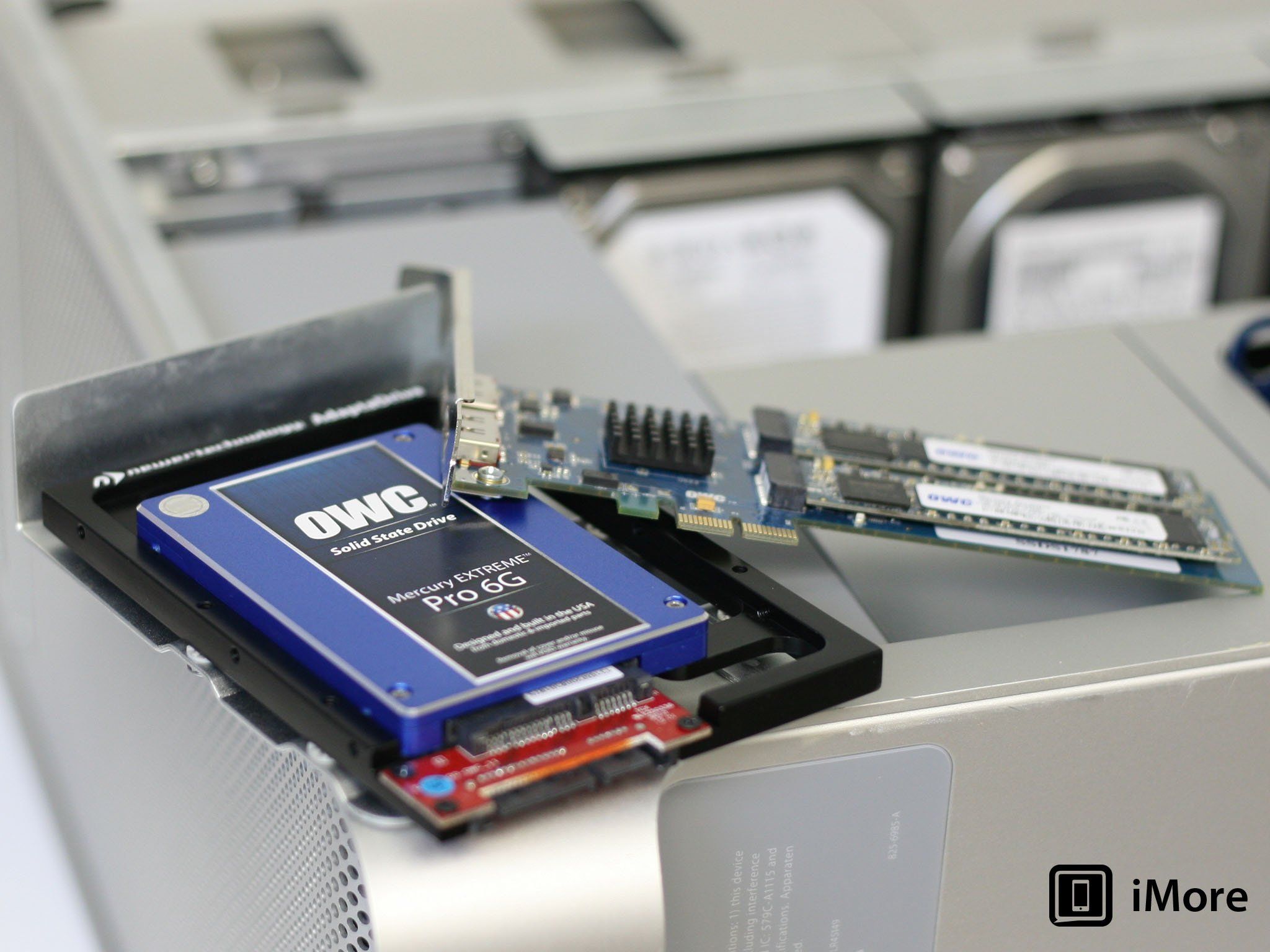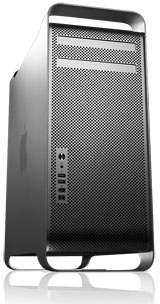Time Machine is an auto backup application in the Mac OS. You can use it to back up (copy) your system to the new drive. It is also a great tool to automatically back up system and important files to a dedicated backup storage device when the computer is not in use. Time Machine was introduced in OS 10.5, so you should have that available with the OS you are using.
Announcement
Collapse
No announcement yet.
Seeking Mac Mini advice/suggestions
Collapse
X
-
Here's a like new SSD on Amazon...$40 cheaper...
sigpicComment
-
That might work. You would then plug into a PCI slot rather that a drive bay.That will save you a bay and no need to buy an adapter.Last edited by megoapesnut; Aug 4, '15, 8:58 AM.Comment
-
That would be fine for youHere's a like new SSD on Amazon...$40 cheaper...
http://www.amazon.com/gp/offer-listi...&condition=allComment
-
Yes, Time Machine is an App installed on your computer. You can access it via your system prefs panel. Actually, anytime you plug a new hard drive into your computer it should pop up and ask if you want to use it with Time Machine. Just plug in a portable or internal drive and run Time Machine to do a full back up. Then, after you do a clean install of the Mac OS onto the SSD, when you boot and have to windows where you need to setup the computer, one of the options will show "restore from Time Machine backup". Choose that option and follow the instructions.Comment
-
It's sold on Amazon too and getting good reviews. Scroll down and read the review from the guy who got the speed boost. Sounds like just what you are looking for.
http://www.amazon.com/OWC-Accelsior-...ds=accelsior+sComment
-
My friend just confirmed that as well!
He did tell me there might be a way to hack it though:
Comment
-
Comment
-
Will do...THANKS!!!Yes, Time Machine is an App installed on your computer. You can access it via your system prefs panel. Actually, anytime you plug a new hard drive into your computer it should pop up and ask if you want to use it with Time Machine. Just plug in a portable or internal drive and run Time Machine to do a full back up. Then, after you do a clean install of the Mac OS onto the SSD, when you boot and have to windows where you need to setup the computer, one of the options will show "restore from Time Machine backup". Choose that option and follow the instructions.sigpicComment
-
Looks intimidating...but I'll read the whole thing...thanks.My friend just confirmed that as well!
He did tell me there might be a way to hack it though:
http://lowendmac.com/2014/modernizin...pro-11-and-21/sigpicComment
-
You know, it's more expensive than an adapter for the HD bay...but the SSD on the PCI slot seems to be much faster than placing the SSD in the HD bay...so it's worth going this route after all...It's sold on Amazon too and getting good reviews. Scroll down and read the review from the guy who got the speed boost. Sounds like just what you are looking for.
http://www.amazon.com/OWC-Accelsior-...ds=accelsior+s
 Apple's new Mac Pro has some Mac users buzzing: the tiny machine appears to be crazy fast, and it's a total redesign of the system - replacing the giant aluminum box of yore with a tiny little black c
Apple's new Mac Pro has some Mac users buzzing: the tiny machine appears to be crazy fast, and it's a total redesign of the system - replacing the giant aluminum box of yore with a tiny little black c
Super thanks, yeah!
I guess that Crucial SSD will work fine with the OWC PCI mount...sigpicComment
-
Okay, it's getting confusing now.
From the PCI slot vs SATA bay site..
 Apple's new Mac Pro has some Mac users buzzing: the tiny machine appears to be crazy fast, and it's a total redesign of the system - replacing the giant aluminum box of yore with a tiny little black c
Apple's new Mac Pro has some Mac users buzzing: the tiny machine appears to be crazy fast, and it's a total redesign of the system - replacing the giant aluminum box of yore with a tiny little black c
"There are a few caveats, depending on the age of your Mac Pro. Early Mac Pros (models built in 2006 and 2007) sport PCIe 1.0 slots that don't perform as fast as later models, so you will be bandwidth-limited on those machines. 2008 models and beyond, like my eight-core Mac Pro, have faster PCIe 2.0 slots. The 2008 model has two 16x slots, and one is occupied by the stock video card. If you're only using one video card, you can use the other for the SSD and see maximum throughput. In any of the other 4x slots you're going to see slower performance. 2009 and newer Mac Pros will see the best performance out of any available slot."
From the questions and answers section:
claustin
"My brother has a first gen Mac Pro from 2007. Mac Pro 1,1 I believe. Would there be any gain in a PCIe SSD running on the PCIe 1.0 slot as opposed to a SATA SSD? Also, is it possible to roll a fusion drive utilizing a PCIe SSD (I've done it on my 2011 mini, so I'm not worried about the process)? I'm just looking to help him milk it as long as he can."
REPLY
Peter Cohen
"In short, no. He's better off with a SATA SSD."
So since I have the first generation aluminum tower Mac Pro 1.1 2007...I guess my best option is to pass on the PCI adapter...and just go with an SSD card mounted on an adapter into a HD bay. Get the Crucial over the OWC as well...great reviews and cheaper priced.
Agree or disagree?sigpicComment
-
Okay, it's getting confusing now.
From the PCI slot vs SATA bay site..
 Apple's new Mac Pro has some Mac users buzzing: the tiny machine appears to be crazy fast, and it's a total redesign of the system - replacing the giant aluminum box of yore with a tiny little black c
Apple's new Mac Pro has some Mac users buzzing: the tiny machine appears to be crazy fast, and it's a total redesign of the system - replacing the giant aluminum box of yore with a tiny little black c
"There are a few caveats, depending on the age of your Mac Pro. Early Mac Pros (models built in 2006 and 2007) sport PCIe 1.0 slots that don't perform as fast as later models, so you will be bandwidth-limited on those machines. 2008 models and beyond, like my eight-core Mac Pro, have faster PCIe 2.0 slots. The 2008 model has two 16x slots, and one is occupied by the stock video card. If you're only using one video card, you can use the other for the SSD and see maximum throughput. In any of the other 4x slots you're going to see slower performance. 2009 and newer Mac Pros will see the best performance out of any available slot."
From the questions and answers section:
claustin
"My brother has a first gen Mac Pro from 2007. Mac Pro 1,1 I believe. Would there be any gain in a PCIe SSD running on the PCIe 1.0 slot as opposed to a SATA SSD? Also, is it possible to roll a fusion drive utilizing a PCIe SSD (I've done it on my 2011 mini, so I'm not worried about the process)? I'm just looking to help him milk it as long as he can."
REPLY
Peter Cohen
"In short, no. He's better off with a SATA SSD."
So since I have the first generation aluminum tower Mac Pro 1.1 2007...I guess my best option is to pass on the PCI adapter...and just go with an SSD card mounted on an adapter into a HD bay. Get the Crucial over the OWC as well...great reviews and cheaper priced.
Agree or disagree?
Unfortunately, I agree. The older Pros do have slower slots and you wouldn't see much of a difference. Not enough to be worth the extra cost.Comment









Comment